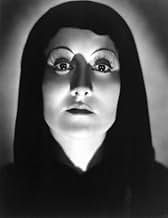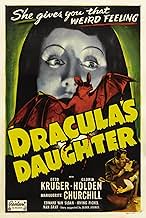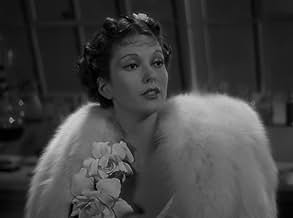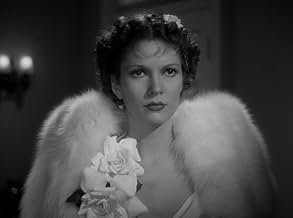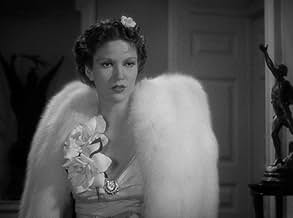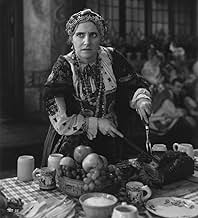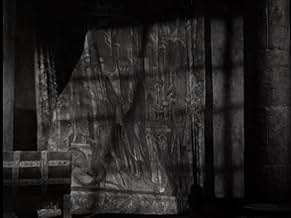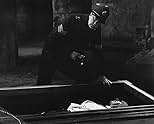VALUTAZIONE IMDb
6,3/10
8743
LA TUA VALUTAZIONE
Aggiungi una trama nella tua linguaWhen Countess Marya Zaleska appears in London, mysterious events occur that lead Dr. Von Helsing to believe that the Countess must be a vampire.When Countess Marya Zaleska appears in London, mysterious events occur that lead Dr. Von Helsing to believe that the Countess must be a vampire.When Countess Marya Zaleska appears in London, mysterious events occur that lead Dr. Von Helsing to believe that the Countess must be a vampire.
- Regia
- Sceneggiatura
- Star
- Premi
- 1 vittoria e 1 candidatura in totale
Halliwell Hobbes
- Hawkins
- (as Halliwell Hobbs)
Claud Allister
- Sir Aubrey
- (as Claude Allister)
Agnes Anderson
- Elena
- (non citato nei titoli originali)
John Blood
- Bobby
- (non citato nei titoli originali)
David Dunbar
- Motor Bobby
- (non citato nei titoli originali)
Douglas Gordon
- Attendant
- (non citato nei titoli originali)
Owen Gorin
- Groom's Friend
- (non citato nei titoli originali)
Recensioni in evidenza
The best of the Universal Dracula films will always be the one from 1931 with Bela Lugosi, which is one of the best and most iconic Universal Studios horrors. But its follow-ups generally are worth a look; Son of Dracula despite Lon Chaney Jnr's miscast Dracula was much better than expected, being a good-looking film with a lot of atmosphere and at least two scenes among the best of any Universal Studios Gothic horror film but House of Dracula while watchable was disappointing apart from a couple of effective sequences, nice sets and a few good performances but did suffer mainly from having too many ideas and not enough time to explore them.
Dracula's Daughter however is the best of them. Is it as good as the 1931 film? No, but it almost is. Two or three things do bring it down. The humour at the beginning with the cops was incredibly hokey and more overly-silly and misplaced than funny. Otto Kruger is an unappealingly stiff male lead, Garth has some very abrupt decision-making that Kruger overdoes to the point it gets annoying. And while the banter between him and Marguerite Churchill's Janet was very enjoyable and witty there was a little too much of it, it could have taken up less of the film and the film could have focused more on Von Helsing. Personal opinion of course.
On the other hand, Dracula's Daughter has great production values. The costumes and sets are sumptuous and splendidly Gothic and the film's beautifully photographed too. The music score, actually sounding original and not stock, compliments the mood very well and has to be one of the eeriest of any of the music scores in the Universal horrors. Dracula's Daughter is wittily scripted as just as I appreciated the film noir-ish-like direction of Son of Dracula I also appreciated the sombre, moody approach that the direction in Dracula's daughter took. The story, apart from the hokey start, is fun and atmospheric, there is a real eeriness but a poignant edge too. Of individual scenes the scene with the Countess Zaleska and Lilli is infamous and for a reason. Apart from Kruger the acting is good, Marguerite Churchill is amusing and Edward Van Sloan once again brings class to Von Helsing but the most memorable turns are from Irving Pichel and especially Gloria Holden. Pichel is effectively sinister especially towards the end while Holden is unforgettable in the title, subtly creepy but somewhat tragic.
All in all, not as good as the 1931 film but of the Dracula sequels Universal made to me Dracula's Daughter's the best one. 8/10 Bethany Cox
Dracula's Daughter however is the best of them. Is it as good as the 1931 film? No, but it almost is. Two or three things do bring it down. The humour at the beginning with the cops was incredibly hokey and more overly-silly and misplaced than funny. Otto Kruger is an unappealingly stiff male lead, Garth has some very abrupt decision-making that Kruger overdoes to the point it gets annoying. And while the banter between him and Marguerite Churchill's Janet was very enjoyable and witty there was a little too much of it, it could have taken up less of the film and the film could have focused more on Von Helsing. Personal opinion of course.
On the other hand, Dracula's Daughter has great production values. The costumes and sets are sumptuous and splendidly Gothic and the film's beautifully photographed too. The music score, actually sounding original and not stock, compliments the mood very well and has to be one of the eeriest of any of the music scores in the Universal horrors. Dracula's Daughter is wittily scripted as just as I appreciated the film noir-ish-like direction of Son of Dracula I also appreciated the sombre, moody approach that the direction in Dracula's daughter took. The story, apart from the hokey start, is fun and atmospheric, there is a real eeriness but a poignant edge too. Of individual scenes the scene with the Countess Zaleska and Lilli is infamous and for a reason. Apart from Kruger the acting is good, Marguerite Churchill is amusing and Edward Van Sloan once again brings class to Von Helsing but the most memorable turns are from Irving Pichel and especially Gloria Holden. Pichel is effectively sinister especially towards the end while Holden is unforgettable in the title, subtly creepy but somewhat tragic.
All in all, not as good as the 1931 film but of the Dracula sequels Universal made to me Dracula's Daughter's the best one. 8/10 Bethany Cox
After years and years of being a Universal horror fan, I finally see "Dracula's Daughter". What an interesting and haunting film it is,too. It's way ahead of the curve in portraying a vampire that wants to escape its cursed existence. The "daughter" of the title longs to live as a real woman but must answer the call of her blood. Is she really a blood relation to Count Dracula or merely a past victim who was especially close to him? Beginning exactly where Todd Browning's "Dracula" left off years earlier, we see Prof. van Helsing arrested for murder when he is found in the vicinity of Dracula's staked-out body. The dull-witted police commissioner believes van Helsing is either a lunatic or a liar but respects his scientific credentials enough to keep him out of jail. Van Helsing seeks the aid of his old student, psychiatrist Jeffrey Garth, to prove his innocence.
Meanwhile, in a truly unusual scene, the body of Count Dracula is stolen from a pair of bumbling policemen by Countess Marya Zaleska and her pale, sinister servant Sandor. The undead Countess merely wants to give Dracula a dignified cremation by fire. His torment is over, but Marya's lingers. She is struggling mightily to resist the call to vampirism but Sandor seems to encourage his mistress to enjoy her bloody deeds.
Through a tangled web of fate, Prof. Garth and Countess Zaleska become entwined. The Countess begs the psychiatrist to give her the willpower to escape her "obsession"...meanwhile, Garth is becoming uneasily aware of Marya's link to several vampire-like murders that have occurred in town. Most tellingly, he notes that her apartment does not have a single mirror...a sure sign of a vampire, according to Van Helsing.
It all ends in Transylvania as the forces of good and evil collide once more.
Gloria Holden is striking as "Dracula's Daughter". Her exotic Slavic looks and wide, hypnotic eyes make it easy to believe she is more than merely human. She has a tragic aura to her, but when she seduces a young girl to become a victim, she also seems repellent.
The real monster of the movie is Sandor, who seems to be manipulating Marya for his own evil ends. Irving Pichel later became a director of some repute, but here he is a scary, foreboding presence with his ominous bass voice, deathly pale skin and Russian garb. Sandor's relationship with Marya is truly unique, as he talks to her as an equal, not a servant.
Otto Kruger is great as Jeffrey Garth, a man of reason and wit who is thrust into the twilight world of the undead. Kruger was a very under-rated actor who should have been more well-known. His sarcastic romantic sniping with his sexy and uppity secretary comes across just as well as his more serious dialogs with van Helsing and Marya. He's a refreshing change from the usual David Manners type hero in the old Universals.
It's a real treat to see Edward van Sloan return in the role of Dr. van Helsing. Calm, rational and collected in his thoughts, he is a contrast to the unholy creatures he duels with. ONe wonders if van Helsing would be sympathetic to Countess Zaleska...or if he would be hell-bent on her destruction. Never do we hear van Sloan's van Helsing voice any understanding or sympathy for the vampires he stalks.
There's some odd comic moments...the two nitwit bobbies at the beginning in particular stick out like a sore thumb...and director Lambert Hillyer's vision of Transylvania seems more like a clichéd Germany, but "Dracula's Daughter" dares to be different from its more famous predecessor and in so doing, emerges as a bit of a classic itself.
Meanwhile, in a truly unusual scene, the body of Count Dracula is stolen from a pair of bumbling policemen by Countess Marya Zaleska and her pale, sinister servant Sandor. The undead Countess merely wants to give Dracula a dignified cremation by fire. His torment is over, but Marya's lingers. She is struggling mightily to resist the call to vampirism but Sandor seems to encourage his mistress to enjoy her bloody deeds.
Through a tangled web of fate, Prof. Garth and Countess Zaleska become entwined. The Countess begs the psychiatrist to give her the willpower to escape her "obsession"...meanwhile, Garth is becoming uneasily aware of Marya's link to several vampire-like murders that have occurred in town. Most tellingly, he notes that her apartment does not have a single mirror...a sure sign of a vampire, according to Van Helsing.
It all ends in Transylvania as the forces of good and evil collide once more.
Gloria Holden is striking as "Dracula's Daughter". Her exotic Slavic looks and wide, hypnotic eyes make it easy to believe she is more than merely human. She has a tragic aura to her, but when she seduces a young girl to become a victim, she also seems repellent.
The real monster of the movie is Sandor, who seems to be manipulating Marya for his own evil ends. Irving Pichel later became a director of some repute, but here he is a scary, foreboding presence with his ominous bass voice, deathly pale skin and Russian garb. Sandor's relationship with Marya is truly unique, as he talks to her as an equal, not a servant.
Otto Kruger is great as Jeffrey Garth, a man of reason and wit who is thrust into the twilight world of the undead. Kruger was a very under-rated actor who should have been more well-known. His sarcastic romantic sniping with his sexy and uppity secretary comes across just as well as his more serious dialogs with van Helsing and Marya. He's a refreshing change from the usual David Manners type hero in the old Universals.
It's a real treat to see Edward van Sloan return in the role of Dr. van Helsing. Calm, rational and collected in his thoughts, he is a contrast to the unholy creatures he duels with. ONe wonders if van Helsing would be sympathetic to Countess Zaleska...or if he would be hell-bent on her destruction. Never do we hear van Sloan's van Helsing voice any understanding or sympathy for the vampires he stalks.
There's some odd comic moments...the two nitwit bobbies at the beginning in particular stick out like a sore thumb...and director Lambert Hillyer's vision of Transylvania seems more like a clichéd Germany, but "Dracula's Daughter" dares to be different from its more famous predecessor and in so doing, emerges as a bit of a classic itself.
"Dracula's Daughter" is a trailblazer in many respects. It's the earliest film I can think of that features a truly sympathetic vampire protagonist. It's also the earliest mainstream film that I'm aware of with such a strong lesbian subtext. (Actually, it's not even a "sub" text, it's plain as day!) As you might expect, these rather surprising elements make it a highly memorable viewing experience - perhaps even more memorable than its predecessor, Lugosi's "Dracula," which is basically just a truncated version of Bram Stoker's novel.
Unfortunately, "Dracula's Daughter" misses the mark of greatness that it probably deserves. The film is only about an hour and ten minutes long, so there isn't sufficient time to fully develop Countess Zaleska, the title character. And it's extremely frustrating that the first fifteen minutes or so are basically squandered on a lot of painfully unfunny business involving two comedy constables. The humor has aged really, really badly, unless you somehow find it convulsively hilarious when one of the constables reacts to every strange and dramatic happening around him by saying "oooh..."
I tend to complain that modern-day horror features too much dumb comedy that hurts its credibility, but "Dracula's Daughter" is living proof that studios were injecting silly rubbish into otherwise good horror material as long as seventy years ago!
The serious parts of the film work well, however. Countess Zaleska and her faithful servant, Sandor, have some interesting exchanges about the loneliness of immortality and the darkness of the vampire's universe. The scene when Zaleska burns her father's body is also very moody and dramatic. (How does one get a job like Sandor's, anyway? Don't you think it would be fun to play personal servant to a glamorous female vampire? No? Maybe it's just me, then.)
If the film has another flaw, aside from the comedy, it's the human protagonist, Dr. Garth. Otto Kruger plays the character as stubborn and really rather abrupt. He'll spew a few lines of psycho-babble at the countess, then charge out of the room and leave his job with her half-done at best. A more attentive psychiatrist might perhaps have made for a more sympathetic and proactive hero. As it is, he's basically just an irritating presence who distracts us from the "villains," who are infinitely more interesting and more worthy of our time.
Unfortunately, "Dracula's Daughter" misses the mark of greatness that it probably deserves. The film is only about an hour and ten minutes long, so there isn't sufficient time to fully develop Countess Zaleska, the title character. And it's extremely frustrating that the first fifteen minutes or so are basically squandered on a lot of painfully unfunny business involving two comedy constables. The humor has aged really, really badly, unless you somehow find it convulsively hilarious when one of the constables reacts to every strange and dramatic happening around him by saying "oooh..."
I tend to complain that modern-day horror features too much dumb comedy that hurts its credibility, but "Dracula's Daughter" is living proof that studios were injecting silly rubbish into otherwise good horror material as long as seventy years ago!
The serious parts of the film work well, however. Countess Zaleska and her faithful servant, Sandor, have some interesting exchanges about the loneliness of immortality and the darkness of the vampire's universe. The scene when Zaleska burns her father's body is also very moody and dramatic. (How does one get a job like Sandor's, anyway? Don't you think it would be fun to play personal servant to a glamorous female vampire? No? Maybe it's just me, then.)
If the film has another flaw, aside from the comedy, it's the human protagonist, Dr. Garth. Otto Kruger plays the character as stubborn and really rather abrupt. He'll spew a few lines of psycho-babble at the countess, then charge out of the room and leave his job with her half-done at best. A more attentive psychiatrist might perhaps have made for a more sympathetic and proactive hero. As it is, he's basically just an irritating presence who distracts us from the "villains," who are infinitely more interesting and more worthy of our time.
Right after the success of James Whale's "Bride of Frankenstein" (sequel to "Frankenstein", also directed by Whale), Universal Studios decided to make a sequel to their other horror classic film, Tod Browning's "Dracula". Story says that the studio chose Whale again for the project, but his script proved to be too outrageous and subversive that was immediately rejected. It would be Garret Fort, writer of the first "Dracula", who would give flesh to the sequel's screenplay and the experienced director Lambert Hillyer was set to direct it. Like "Bride", this sequel would be focused on a feminine version of the previous monster; it's name, "Dracula's Daughter".
The film starts right after the original ends, with Count Dracula killed by Professor Van Helsing (Edward Van Sloan), however, to his misfortune, he is arrested for the murder of the Transylvanian nobleman and sent to prison as nobody believes he killed an ancient vampire. Realizing that nobody will believe him, Van Helsing asks the help of his dear friend, Dr. Jeffrey Garth (Otto Kruger), a former student of his who has become a prominent psychiatrist. While this events happen, a mysterious woman steals Dracula's body and a new series of murders start, complicating Van Helsing's defense and Garth's investigation. To make things worse, Countess Marya Zaleska (Gloria Holden) arrives and her seductive charms will prove too strong for Garth to resist them.
Unlike "Frankenstein", where there was still material in the source novel to build up a sequel; in "Dracula"'s case things get complicated, as the monster is effectively killed at the end. However, Garret Fort builds up an original story of mystery, horror and even nods to screwball comedy. "Dracula's Daughter"'s themes of betrayal, deception, and the quest for redemption are dark indeed, but Fort manages to add some light-hearted moments that break the suspense in an appropriate manner. Another highlight is that the vampire's sex appeal is enhanced and explored even further than posterior sequels of the now-franchise.
Director Lambert Hillyer had a big experience directing many low-budget films, ranging from westerns to crime dramas, so he was used to work with similar budget constrains. The movie's strength is in its story, and Hillyer knew it, so he keeps a simple yet very effective style that, while nothing too impressive, manages to create the perfect atmosphere for the plot. With nothing more than his well assembled cast and Fort's excellent screenplay, he conceives a film that maybe won't be remembered as influential, but will surely tell its story properly and deliver what it promises.
The cast is vital in this film, as their job is what sets apart the film from other Universal sequels. Otto Kruger is a very good lead actor, with nice looks and an ease for this kind of characters. He has great chemistry with both Gloria Holden and Marguerite Churchill and his performance is one of the film's highlights. Holden portrays the seductive Countess with power and grace in a complicated role as her character is at the same time dominated by a strong sex appeal and a sad and tragic fate. Churchill is superb in her comedy role, and more than mere comic relief, she adds the touch of screwball comedy to the film, giving her energy and charm. And finally, Edward Van Sloan returns as the experienced Van Helsing, and while his role here is more as a spiritual guide to Kruger, he gives another fine performance.
The film's main weakness is without a doubt its low-budget, that not only forced the choice of Hillyer as a director, but it also made it have less production values than other sequels. In a way, this may had been of help, as Hillyer's style bends together perfectly with low-budget projects and also gave the film a look closer to crime melodrama, which was rising in popularity at the time. Sure, Bela Lugosi is definitely missed, but "Dracula's Daughter" makes up for his absence with a witty (and bold for its time) screenplay and a well-assembled cast.
Time has left this film unappreciated, but there is a lot in there to praise, and while nowhere near the best of the Classic Universal Horror films, "Dracula's Daughter" is better than many of the films of its time, and an essential viewing for any fan of Gothic horror. 7/10
The film starts right after the original ends, with Count Dracula killed by Professor Van Helsing (Edward Van Sloan), however, to his misfortune, he is arrested for the murder of the Transylvanian nobleman and sent to prison as nobody believes he killed an ancient vampire. Realizing that nobody will believe him, Van Helsing asks the help of his dear friend, Dr. Jeffrey Garth (Otto Kruger), a former student of his who has become a prominent psychiatrist. While this events happen, a mysterious woman steals Dracula's body and a new series of murders start, complicating Van Helsing's defense and Garth's investigation. To make things worse, Countess Marya Zaleska (Gloria Holden) arrives and her seductive charms will prove too strong for Garth to resist them.
Unlike "Frankenstein", where there was still material in the source novel to build up a sequel; in "Dracula"'s case things get complicated, as the monster is effectively killed at the end. However, Garret Fort builds up an original story of mystery, horror and even nods to screwball comedy. "Dracula's Daughter"'s themes of betrayal, deception, and the quest for redemption are dark indeed, but Fort manages to add some light-hearted moments that break the suspense in an appropriate manner. Another highlight is that the vampire's sex appeal is enhanced and explored even further than posterior sequels of the now-franchise.
Director Lambert Hillyer had a big experience directing many low-budget films, ranging from westerns to crime dramas, so he was used to work with similar budget constrains. The movie's strength is in its story, and Hillyer knew it, so he keeps a simple yet very effective style that, while nothing too impressive, manages to create the perfect atmosphere for the plot. With nothing more than his well assembled cast and Fort's excellent screenplay, he conceives a film that maybe won't be remembered as influential, but will surely tell its story properly and deliver what it promises.
The cast is vital in this film, as their job is what sets apart the film from other Universal sequels. Otto Kruger is a very good lead actor, with nice looks and an ease for this kind of characters. He has great chemistry with both Gloria Holden and Marguerite Churchill and his performance is one of the film's highlights. Holden portrays the seductive Countess with power and grace in a complicated role as her character is at the same time dominated by a strong sex appeal and a sad and tragic fate. Churchill is superb in her comedy role, and more than mere comic relief, she adds the touch of screwball comedy to the film, giving her energy and charm. And finally, Edward Van Sloan returns as the experienced Van Helsing, and while his role here is more as a spiritual guide to Kruger, he gives another fine performance.
The film's main weakness is without a doubt its low-budget, that not only forced the choice of Hillyer as a director, but it also made it have less production values than other sequels. In a way, this may had been of help, as Hillyer's style bends together perfectly with low-budget projects and also gave the film a look closer to crime melodrama, which was rising in popularity at the time. Sure, Bela Lugosi is definitely missed, but "Dracula's Daughter" makes up for his absence with a witty (and bold for its time) screenplay and a well-assembled cast.
Time has left this film unappreciated, but there is a lot in there to praise, and while nowhere near the best of the Classic Universal Horror films, "Dracula's Daughter" is better than many of the films of its time, and an essential viewing for any fan of Gothic horror. 7/10
In London, two policemen find the body of a man, Renfield, with neck broken and Dracula with a stake through his heart. They arrest Prof. Von Helsing (Edward Van Sloan) that tells that he did it and take him to the Scotland Yard. The inspector Sir Basil Humphrey (Gilbert Emery) asks Von Helsing who might defend him and the professor asks for the psychiatrist Dr. Jeffrey Garth (Otto Kruger). Meanwhile, the mysterious Countess Marya Zeleska (Gloria Holden), who is Dracula's daughter, compels the policeman that is in charge to take care of the bodies and takes Dracula's body with her to bury him with her assistant Sandor (Irving Pichel) before dawn, expecting to be released from the family's curse.
In Edinburgh, Jeffrey is hunting with friends and his assistant Janet Blake (Marguerite Churchill) comes to tell him that he has an appointment with the Scotland Yard to help his friend Von Helsing. When Von Helsing tells him about Dracula, Jeffrey believes that he is obsessed with the vampire and promises to help him. During the night, he goes to a party where he meets the Hungarian Countess and he tells his theories about the vampire blood thirsty that he believes is an obsession. Now, Countess Zeleska believes that Jeffrey can heal her and release her from her blood thirsty and she wants to bring him to her castle to spend the eternal life with her in Transylvania.
"Dracula's Daughter" is a great vampire movie, with the dramatic story of a vampire woman that wishes to be free from the curse of her father, Dracula. The plot is naive and funny, and the relationship between the annoying Jeffrey and the witty Janet is amusing. This is one of the best movies of Universal Studios in this genre. My vote is seven.
Title (Brazil): "A Filha de Drácula" ("The Dracula's Daughter")
In Edinburgh, Jeffrey is hunting with friends and his assistant Janet Blake (Marguerite Churchill) comes to tell him that he has an appointment with the Scotland Yard to help his friend Von Helsing. When Von Helsing tells him about Dracula, Jeffrey believes that he is obsessed with the vampire and promises to help him. During the night, he goes to a party where he meets the Hungarian Countess and he tells his theories about the vampire blood thirsty that he believes is an obsession. Now, Countess Zeleska believes that Jeffrey can heal her and release her from her blood thirsty and she wants to bring him to her castle to spend the eternal life with her in Transylvania.
"Dracula's Daughter" is a great vampire movie, with the dramatic story of a vampire woman that wishes to be free from the curse of her father, Dracula. The plot is naive and funny, and the relationship between the annoying Jeffrey and the witty Janet is amusing. This is one of the best movies of Universal Studios in this genre. My vote is seven.
Title (Brazil): "A Filha de Drácula" ("The Dracula's Daughter")
Lo sapevi?
- QuizOriginally, Universal wanted to make a sequel based on Bram Stoker's short story 'Dracula's Guest' and negotiated with Stoker's widow Florence. During the talks between the two, it was discovered that Bram Stoker had not complied with one requirement of the U.S Copyright office with his novel 'Dracula', which rendered it public domain in the United States. Because Florence wanted more creative control over the sequel, and Bela Lugosi wanted more money to reprise the role of Count Dracula, Universal instead hired John L. Balderston to write a new story.
- BlooperAlthough the film takes place mostly in London, telephones consistently ring one ring at a time, whereas British phones have always used a double ring.
- Citazioni
Lady Esme Hammond: Sherry, Marya?
Countess Marya Zaleska: Thank you, I never drink... wine.
- ConnessioniFeatured in Shock Theater: Dracula's Daughter (1959)
I più visti
Accedi per valutare e creare un elenco di titoli salvati per ottenere consigli personalizzati
Dettagli
- Data di uscita
- Paese di origine
- Siti ufficiali
- Lingue
- Celebre anche come
- La hija de Drácula
- Luoghi delle riprese
- Azienda produttrice
- Vedi altri crediti dell’azienda su IMDbPro
- Tempo di esecuzione
- 1h 11min(71 min)
- Colore
- Proporzioni
- 1.37 : 1
Contribuisci a questa pagina
Suggerisci una modifica o aggiungi i contenuti mancanti


